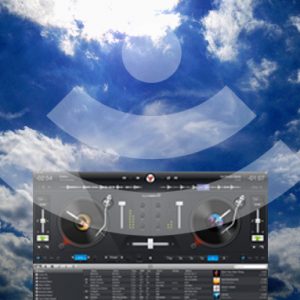
Cloud Mixing – what does the future hold for DJs?
DJs have a strange relationship with technology.
On one hand – without the technological innovations of pitch controls and direct drive turntables, would DJing have ever taken off in the way it did? It’s an artform entirely build around technology.
On the other, any new tech today is generally greeted with a chorus of “THAT’S NOT REAL DJing!” from crusty old veterans of the game. The snobbishness about CDJs has only recently gone away, and lots of CDJ users are sniffy about those who use a laptop to store their music. And let’s not even go near the sync debate! 
But one thing is for sure – technology will carry on moving forward at the speed of light, and one of the innovations that seems inevitable is “cloud DJing”. That is, playing music streamed directly from the internet. This opens up a whole world of opportunities, and also pitfalls (will we ever again be able to say to a requester “sorry, not got it”?). The recent Denon SC6000 and SC6000m include wifi as standard, so this is clearly seen as a key part of the future, and Serato has long had a tie-in with Tidal. Once 5G is standard around the world, with the speeds that will bring, this will make this revolution seem the obvious option, vs carrying music around physically, like some sort of caveman.
This fantastic article by Declan McGlynn in DJ Mag explores the implications of cloud DJing in real depth, and is well worth your time. It touches on the analytics side – being able to know who is playing which songs, where, for how long, where are cue points, when are they mixing out. There will be mountains of data from such a service, which should help royalties go to the correct artists, and enable DJs and artists to work out where to arrange gigs and tours more accurately.
The biggest obvious benefit for DJs is having access to such a vast library of music – basically, any tunes on whatever platforms become available to mix with. Quite how this works financially will be interesting to unpack – but it seems likely that it will be a subscription model, with royalties to artists proportionately, based on what DJs actually play. Given how many DJs only play pirated music, that’s a net win for producers getting something financially, even if the rewards of services like Spotify are notoriously low, unless they clock up vast numbers!
With AI and machine learning, there are other implications for DJs to consider though – will this create a situation where an automated DJ-bot can more accurately mix and blend, and understand how to react to different times in different venues, after analysing the sets and mixing of thousands, maybe millions, of DJs? Will it be able to sync to CCTV to work out what is needed, and switch from bar grooves to dancefloor killers? Apparently versions of this tech are already in situ in places in Las Vegas, and most likely elsewhere too.

How to respond to this? Denial is always a popular tactic – “It’ll never happen!”
And maybe that’s true… But a safer approach – make yourself indispensable.
Heavy Hits obviously provides you with lots of ways to personalise your sets vs the tunes you will find on Spotify – acapella in/out edits, transition edits, and the kind of knowledge in our playlists that gives you access to the libraries of some of the best DJs in the world!
Build your stage presence, work on mic skills, get involved with promotion – whatever it is, make yourself unique enough that a machine playing from iTunes isn’t going to have a chance in hell of replicating your value, no matter how good the AI!

